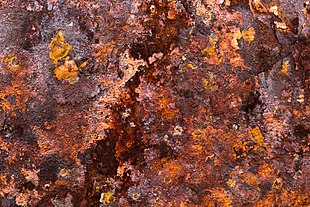disease caused by a certain group of fungi and characterized by reddish brown spots on the foliage and/or the formation of stem galls.
This article needs additional citations for verification. (June 2012) (Learn how and when to remove this template message) |
Rust is an iron oxide, a usually red oxide formed by the redox reaction of iron and oxygen in the presence of water or air moisture. Several forms of rust are distinguishable both visually and by spectroscopy, and form under different circumstances. Rust consists of hydrated iron(III) oxides Fe2O3·nH2O and iron(III) oxide-hydroxide (FeO(OH), Fe(OH)3).
Given sufficient time, oxygen, and water, any iron mass will eventually convert entirely to rust and disintegrate. Surface rust is flaky and friable, and it provides no protection to the underlying iron, unlike the formation of patina on copper surfaces. Rusting is the common term for corrosion of iron and its alloys, such as steel. Many other metals undergo similar corrosion, but the resulting oxides are not commonly called rust.
Other forms of rust exist, like the result of reactions between iron and chloride in an environment deprived of oxygen. Rebar used in underwater concrete pillars, which generates green rust, is an example. Although rusting is generally a negative aspect of iron, a particular form of rusting, known as "stable rust," causes the object to have a thin coating of rust over the top, and if kept in low relative humidity, makes the "stable" layer protective to the iron below, but not to the extent of other oxides, such as aluminum.

